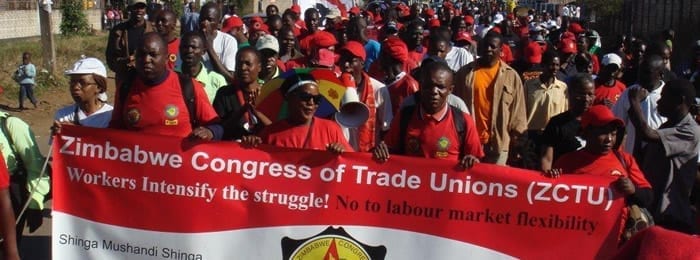The Zimbabwe Congress of Trade Unions (ZCTU) will take to the streets in six cities on Saturday to protest economic stagnation and an increasingly repressive environment for workers, civil society activists and human rights defenders.
Over the years, the ZCTU has tracked the steady decline in the country’s economic situation and its widening informal economy—where more than 80 percent of Zimbabweans work for irregular pay or no pay at all. And it has decried the ever-dwindling number of formal jobs: down by nearly 10,000 positions in 2013 and more than 5,000 in 2014, according to its calculations.
As the economy sputters, the government is threatening to cut wages, pushing to gut the country’s labor laws and blaming workers for the country’s terrible economic situation.
The march will take place in an increasingly threatening environment for activists. Last month Itai Dzamara, a leading pro-democracy advocate, was abducted. He remains missing, and leading civil society organizations—including the ZCTU—are calling on the government to ascertain his whereabouts and prosecute his abductors.
Police in the cities of Bulawayo, Mutare and Masvingo initially refused to grant permission for the demonstrations, but reversed their decisions after the Harare police agreed to allow the demonstration there, according to the International Trade Union Confederation (ITUC).
In 2010, an International Labor Organization (ILO) commission found serious government interference in ZCTU meetings and demonstrations in violation of ILO Convention 87 on freedom of association and Convention 98 on collective bargaining. The ITUC notes that while the government pledged to the ILO that police and security forces would receive training and education to prevent such violations in the future, the interference continues.

